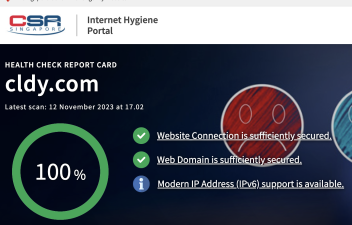Introduction:
The rapid evolution of digital technologies and the shifting landscape of consumer preferences have necessitated businesses to adapt and thrive in the digital realm. As organisations embark on their digital journey, the need for efficient, reliable hosting solutions is more significant than ever, and cloud hosting emerges as a powerful enabler to drive seamless digital experiences. Designed to cater to the dynamic needs of modern businesses, cloud hosting has quickly become a popular choice, offering unmatched scalability, flexibility, and cost efficiency.
Cloud hosting decentralises the infrastructure used to power your website and applications, spreading the resources across multiple connected servers, ensuring quick and easy access to necessary resources when needed. This approach brings several advantages, from virtually limitless scalability to improved performance and reliability, enabling businesses to address their customers’ demands more effectively.
In this post, we will delve into the world of cloud hosting, exploring its core benefits and potential challenges. Additionally, we will demystify the concepts of public, private, and hybrid cloud hosting options, giving you the knowledge to choose the best fit for your unique business needs. We will also share valuable insights into best practices for adopting and managing cloud hosting solutions, empowering you to make a seamless transition that fuels your business’s digital growth.
Join us in this exploration of the cloud hosting landscape as we help you navigate the complexities of adopting and implementing the right hosting solutions, positioning your business to flourish in the digital era. With a strong understanding of cloud hosting concepts, you will be well-equipped to make informed decisions that propel the success of your business’s digital journey.
Understanding the Different Types of Cloud Hosting
Before diving into the potential benefits and challenges of cloud hosting, it’s crucial to understand the different types of cloud hosting options available:
- Public Cloud Hosting
In a public cloud, resources are shared amongst multiple users, offering a cost-effective, flexible, and scalable hosting solution. Public cloud hosting is particularly suitable for small and medium-sized businesses that may not require extensive resources or stringent security measures.
- Private Cloud Hosting
Private cloud hosting dedicates resources exclusively to a single organisation, providing enhanced control, security, and performance. This hosting solution is ideal for large businesses or those with strict security and compliance requirements.
- Hybrid Cloud Hosting
A hybrid cloud hosting solution combines elements of both public and private cloud hosting, allowing businesses to strategically allocate resources based on their specific needs and requirements. This offers a balance between cost-efficiency and increased security.
The Advantages of Cloud Hosting for Businesses
Cloud hosting offers numerous benefits that can help businesses excel in the digital realm:
- Scalability and Flexibility
Cloud hosting enables businesses to easily scale their resources up or down as their needs evolve. This means that businesses can quickly respond to fluctuations in web traffic, ensuring that users continue to enjoy optimal performance.
- Enhanced Performance and Reliability
With resources spread across multiple connected servers, cloud hosting lessens the risk of server failure or downtime. This ensures a more reliable and consistent browsing experience for users, fostering customer satisfaction and loyalty.
- Cost Efficiency
Cloud hosting operates on a pay-as-you-go model, meaning that businesses only pay for the resources they consume. This allows cost savings and eliminates the need for significant upfront investments in hardware and maintenance.
- Simplified Backup and Disaster Recovery
Automated and regular cloud backups facilitate swift data recovery in the event of data loss or server failure. This ensures minimal disruption to your business operations and strengthens the security and resilience of your online presence.
Navigating the Challenges of Cloud Hosting
While cloud hosting offers numerous advantages, businesses must also be aware of the potential challenges and prepare strategies to address them:
- Data Security and Privacy
Data security can be a concern when moving to a cloud hosting solution. It’s essential to choose a reputable provider with robust security measures in place, such as encryption, firewalls, and intrusion detection systems.
- Infrastructure Control
With cloud hosting, businesses may have limited control over the underlying infrastructure compared to traditional hosting solutions. It’s crucial to select a cloud hosting provider that enables a degree of customisability when configuring server settings.
- Compliance and Regulations
Organisations within heavily regulated industries must ensure their cloud hosting solution complies with relevant industry standards and data protection regulations. This may require a more meticulous evaluation of potential providers concerning their security certifications and data privacy policies.
Best Practices for Adopting and Managing Cloud Hosting Solutions
When adopting cloud hosting solutions, consider the following best practices to make the transition smooth and maximise the benefits:
- Assess Your Business Requirements
Begin by evaluating your business’s unique needs, such as resource requirements, security, and performance expectations. This will help you choose the most suitable type of cloud hosting for your organisation.
- Choose a Reputable Provider
Take the time to research and compare potential cloud hosting providers, considering factors like pricing, customer support, security features, and customisability. Prioritise providers with a proven track record of reliability and support.
- Plan for Migration and Integration
Develop a comprehensive migration and integration plan, including contingencies for potential risks, such as data loss or downtime during the transition.
- Regularly Monitor and Optimise Performance
Ensure optimal performance by continually monitoring resource usage, application performance, and server configurations. Adjust as needed to maintain efficient resource allocation and peak performance.
Conclusion: Accelerate your Digital Journey with Cloud Hosting
Cloud hosting offers businesses an efficient, flexible, and cost-effective solution to deliver exceptional digital experiences. With an understanding of the advantages, challenges, and best practices associated with cloud hosting, your business will be well-positioned to make informed decisions that propel its digital journey forward.
Embrace the power of cloud hosting to elevate your business’s online presence, strengthen customer loyalty, and gain a competitive edge in today’s digital landscape. By adopting and managing your cloud hosting solution strategically, your business will unlock the full potential of this innovative technology and thrive amidst the ever-evolving digital revolution.
Looking for reliable and top-notch web hosting solutions? CLDY’s hosting services are tailored to meet the specific needs of SME customers, ensuring that your website is always up and running smoothly. Whether you need cloud hosting, email hosting, or web hosting, we have the expertise and infrastructure necessary to provide you with the best possible experience. Don’t settle for mediocre hosting services that can jeopardize your online presence. Choose CLDY today and experience the difference!










